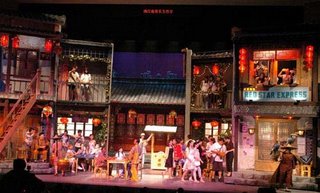Yangshuo. Almost 20 years ago that I went there for the first time, and what a place it was ...
Lining the Li River in China's Guangxi province, the village was on a 2 hours ride from Guilin's main bus station. Sitting in the majestic countryside with it's typical karst formations, it's one of the most breathtaking sceneries one was likely ever to watch in China. Watched over by Moon hill, the cormorant fishermen would light their lamps at night and send their birds off into the water. You could make magnificent bicycle rides towards the neighbouring villages. Yet this was not the mainstream village you were prone to come across in any part of the vast Chinese countryside. First thing that caught my eye getting down the bus was this sign advertising dorm beds for 10 Renminbi a night in the ... Hilton Hotel. The next morning you could then take your pick of "80 kinds of Western breakfast" in the Charlie Chaplin bar, and the best part of it was that neither was a hoax. You could indeed sleep dirt cheap and have excellent food, while still not having the feeling you were caught in a tourist trap. It was not exactly off the beaten track anymore already back then in 1988, but it was as pleasant as it got in China.
I get very worried however when I read
this article from the China Daily.
Musical Dedicated to tourism paradise - Yangshuo West Street
"A long-awaited musical with distinctive ethnic features has finally been presented. After two years of persistent hard work, Yangshuo West Street made its debut in Nanning Theatre of Southwest China's Guangxi Zhuang Autonomous Region on September 10, and will continue for 30 performances in Nanning before it will move to Guilin for long-term commercial performances.
With a beautiful story, strong cast, and marketing operations, the program highlights the performing stage of a region known for its signature ethnic flavor. The work is bound to impress the audience with its brand-new notions, visual effects, and artistic brilliance."
Will somebody please wake me up and tell me it's just a dream?
"With a beautiful story, strong cast, and
marketing operations" ???!!
"Bound to impress the audience with it's
brand-new notions" ???!!
Sure those are the things I am looking for first thing whenever I go to see a play or a musical. I love to engage in discussions on the poor "marketing operations" that can be found in Beckett's "Waiting for Godot" ... so bad to keep people waiting.
All joking aside, clearly as is that this is a marketing vehicle to draw even more tourists to this little enchanting village, one would wonder why the hell they needed it ? The people in Yangshuo, gifted with the entrepreneural spirit common to masses of Chinese, were their own best marketeers. But getting at this point, I find myself always confronted with the question what does it do to the locals ? How does it affect their lives and is it able to pull them out of poverty, of which, to be sure, I saw a fair deal in those days around Yangshuo. Or is the big money going into other pockets and do the real
aborigines get moved out to other places ? What if the answer is affirmative ? We, who can afford to be travelling around, may in the end be finding ourselves pondering the choice whether we go to Disneyland A or Disneyworld B today, but at least it will have benefitted a lot of people. Worse is , what if the answer is no ? How about what the world is loosing in places like Yangshuo, getting trampled by mass tourism / consumerism ? Another example of the same sort that comes to mind are the Mosuo, the people from Lake Lugu and their matrilinear traditions (not matriarchal, as is often mistakenly stated). Are they in the end off for the better of the worse ?
Whenever I face the question, I admit I don't know the answer.










